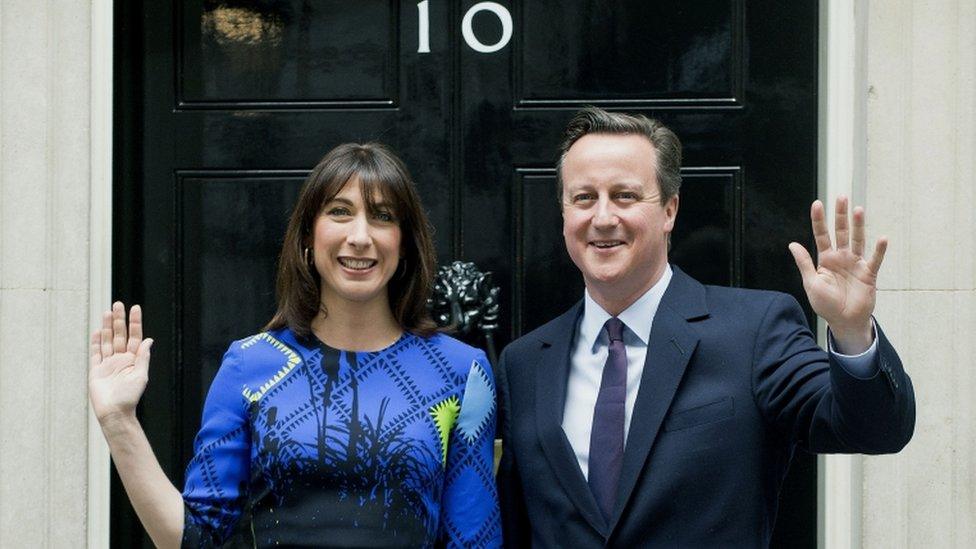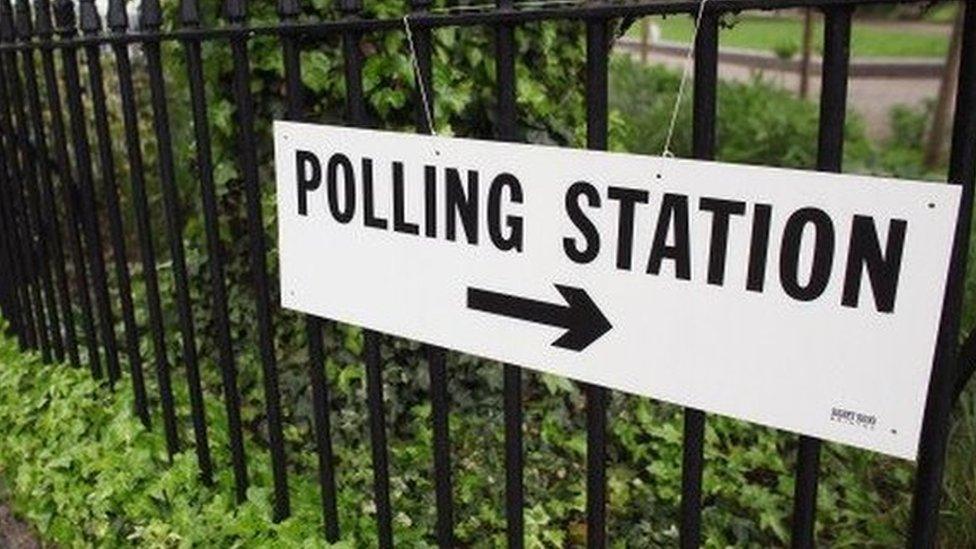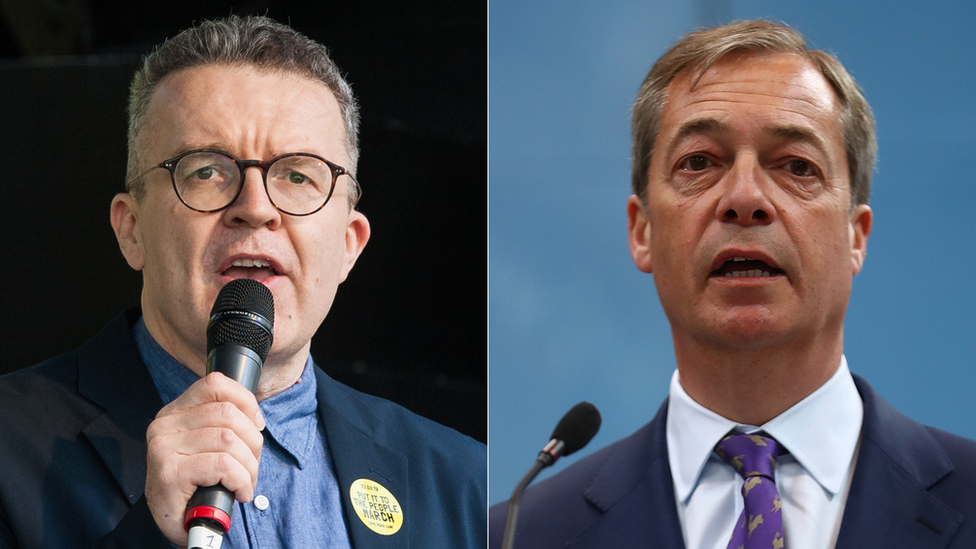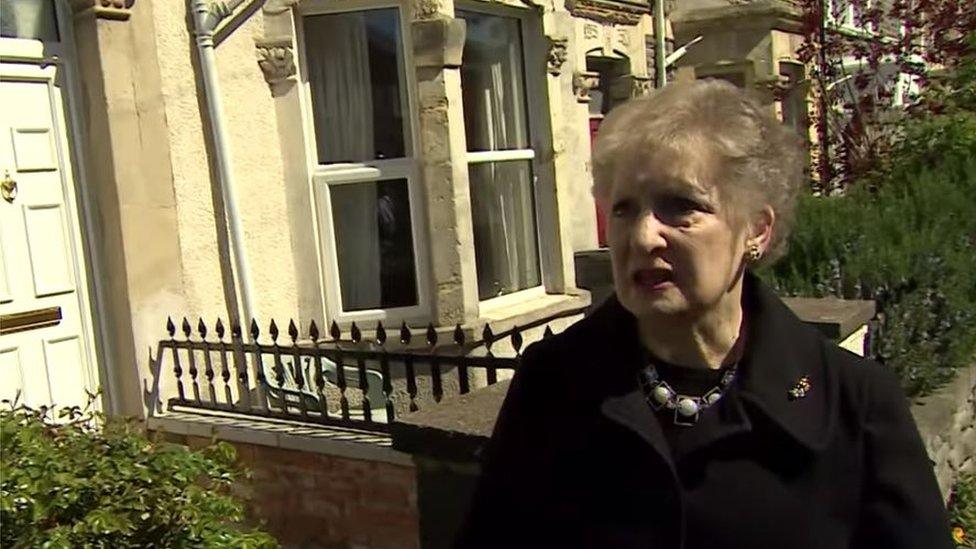Local elections to put parties and voters to the test
- Published

Anyone remember this? Samantha and David Cameron outside Number 10 a day after the 2015 general election victory
Who remembers 2015?
In the helter-skelter, highly-charged world of politics, so much has happened since David Cameron's Conservative general election victory that 2015 seems more like ancient history than just four years ago.
Since then we've had the EU Referendum which brought Mr Cameron's premiership to an abrupt full-stop and triggered the chain of events culminating in the present Parliamentary and political crisis, made worse for the Conservatives by Theresa May's decision, one year later, to call the general election which deprived her party of their Commons majority.
Now though, the ghost of 2015 is about to rear up once again.
It's the "base year" for the council elections: the last time most of these seats were contested was indeed in that Conservative "high-water mark" year, when they won seats deep in traditional Labour areas: in Stoke-on-Trent, where they share power in coalition with the City Independents and in the Black Country, where they run Walsall Council with the casting vote of the mayor and in Dudley where they currently have 35 councillors to Labour's 36.
Collateral damage
With seats to be contested on 28 local councils on Thursday 2 May 2019, we always warn that local elections are important events in their own right, and not merely some sort of subtext to the national political debate.

Will disenchanted voters voice their opinion by staying at home?
But year after year I have seen entire generations of committed, able, hard-working councillors from all sides of the political firmament swept away by the remorseless tides of Westminster politics, over which they have no control but suffer the collateral damage just the same.
No party faces a sterner test in this respect than the Conservatives.
That "high-water mark" I mentioned would make it quite tough enough for them to hang on to what they hold even before you factor-in the effects of the ructions in the Parliamentary party in general, and the role of the prime minister in particular.
The latest polls suggest the Tories may have to brace themselves for some catastrophic losses, costing them hundreds of those hard-won seats.
But these elections are not without dangers for Labour too.
The position of "constructive ambiguity" over a further referendum risks annoying their Remain-supporting voters in places like Warwick just as much as it angers their Leave-supporters in Walsall and Dudley.

Labour must promise another Brexit referendum to counter the electoral challenge posed by Nigel Farage, deputy leader Tom Watson said.
That's why West Bromwich East MP and Deputy Labour Leader Tom Watson warned his party's "mealy-mouthed" failure to come out in support of another public vote would play into the hands of Nigel Farage's Brexit party when, or if, we go to the polls in European elections towards the end of May.
And the emergence of the new pro- and anti-Brexit parties, gearing-up for possible European elections, represents another big shadow looming over these local polls, even though they are not directly taking part in them.
Will Nigel Farage's latest incarnation as leader of the Brexit party pile yet more misery on UKIP, who are already embroiled in a potentially vote-splitting fight with the breakaway Black Country Party?
Will the Remain-supporting Change UK party, emerging from the independent group of former Conservative and Labour MPs, further squeeze the Liberal Democrats, ironically the one party who have campaigned for "an exit from Brexit" right from the start? The Lib Dems are currently languishing at a 35-year low in our town halls' council chambers.

Another one? Are we all Brenda Parsons from Bristol?
And do the Greens run the risk of seeing their mantle stolen by the Extinction Rebellion protesters whose spectacular protests in London and Edinburgh have reinforced the notion that conventional politics have failed adequately to address climate change?
Despite all my blandishments, this time there's no getting away from it: these polls are completely bound-up with Brexit, and may be seen as warm-up events for those potential European elections, like a referendum in all but name.
The Midlands Battlefield
Undaunted, let's close our eyes and ears to all the distractions and survey our region's local election battlefield. But the elephant NOT in the room is the biggest of all, Birmingham, where last year's all-out election gave every city councillor a four-year term. Otherwise they break down as follows:
METROPOLITAN AUTHORITIES VOTING IN THIRDS
Coventry, Dudley, Sandwell, Solihull, Walsall and Wolverhampton
I have explained why Dudley and Walsall are on a Lab/Con knife-edge. The others look safe for Labour except for Solihull which, in normal times, would be a Conservative stronghold: but these are not normal times.
UNITARY COUNCILS WITH ALL-OUT ELECTIONS
Herefordshire, Stoke-on-Trent, Telford and Wrekin
Again, in normal times the Tories would expect to retain Herefordshire but this time they face concerted opposition from "It's Our County" and Independent candidates. Labour are so determined to wrest control of Stoke from the City Independent-Conservative coalition that they launched their national campaign there. Labour say they are confident of retaining control of Telford and Wrekin even though they have an over all majority of just one seat.
DISTRICT COUNCILS WITH ALL-OUT ELECTIONS
Bromsgrove, Cotswold, East Staffordshire, Lichfield, Malvern Hills, North Warwickshire, South Staffordshire, Stafford, Staffordshire Moorlands, Stratford-on-Avon, Tewkesbury, Warwick, Wychavon, Wyre Forest.
Cotswold and Warwick were two of just three Midlands local authority areas which voted to remain in the EU. Generally, though, these are the Conservative heartlands where local Conservative councillors and activists are said to be raging at the government's failure to deliver Brexit on time, with many threatening to switch support to the Brexit party in the event of European elections going ahead. So could these be among the killing fields for the Conservatives? Warwick and North Warwickshire may be among the ones to watch.
DISTRICT COUNCILS VOTING IN THIRDS
Cannock Chase, Redditch, Rugby, Tamworth, Worcester
Voting in thirds offers less scope for sweeping changes compared with the all-out elections but the Conservatives face a battle to prevent Labour eroding their majorities in Redditch and Worcester.
"Only fools predict elections"
So said the late-lamented Liberal Democrat Leader Paddy Ashdown. Who am I to disagree?
This year's local elections involve so many different moving parts, contradictions, ironies, disconnections and imponderables that calling the results seems even more of a mug's game than ever. Much will depend on turnout. At a time when so many voters tell us how frustrated or angry they are about the political logjam there may be plenty more Brendas far beyond the city limits of Bristol.
Disenchanted Conservative and Labour voters may vent their feelings this time by simply staying at home. Our region's 27 uncontested seats may have the Electoral Reform Society fuming that "voters are being denied their democratic rights": but how many potential electors really want to exercise them?
So a low turnout would not be a great surprise.
On the other hand, might the anger and frustration I mentioned motivate some sections of the community to vote in great numbers?
Perhaps the only certainty is we don't have long to wait to find out.